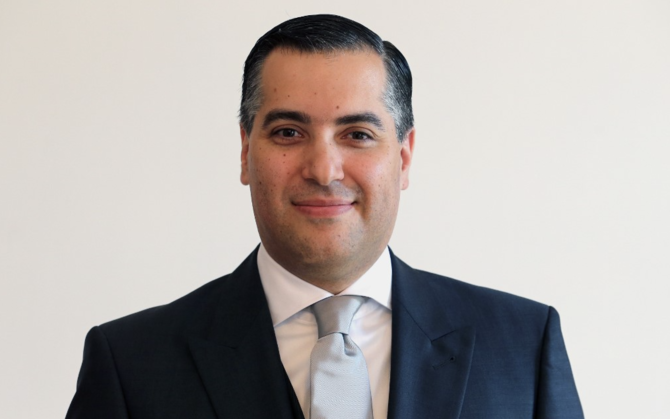BEIRUT: Lebanon’s feuding politicians scrambled on Sunday to present a semblance of stability ahead of the arrival in Beirut on Monday of French President Emmanuel Macron.
Mustapha Adib, the ambassador to Germany, looks set to be named prime minister after he was nominated by both the Future Movement, the main Sunni bloc led by former prime minister Saad Hariri, and the largest Christian bloc, the Free Patriotic Movement, led by former foreign minister Gebran Bassil.
The Iran-backed Hezbollah group and its ally the Amal Movement are also expected to support Adib’s nomination.
He will replace Hassan Diab, who resigned this month amid an outpouring of public anger after a devastating explosion at Beirut port killed nearly 190 people. Lebanon is also grappling with a financial meltdown that has devastated the economy.
Adib, 48, has a Ph.D. in political science and has been Lebanon’s ambassador in Germany since 2013. He is close to former prime minister Najib Mikati.
Dr. Mustafa Alloush, a leading figure in the Future Movement, told Arab News earlier that the group would nominate “a person who has no political ambition.”
“Our nomination will be consistent with the conditions of French President Emmanuel Macron, that is, the character should not be one of the politicians in power,” he said.
Adib already faces opposition from the ranks of demonstrators who have taken to the streets since last October in protest at Lebanon’s inept and corrupt political class.
“We reject the outcome of parliamentary consultations, which is already known in advance and will, as usual, lead to a so-called government of national unity, one that is cooked up abroad,” said Naji Abou Khalil, a member of the National Bloc opposition party that backs the protest movement.
In his Sunday sermon, Maronite Patriarch Bechara Al-Rai said he was hoping for “a mini emergency government with the necessary powers for the state to rise from the bottom of its economic, financial and social misery and achieve the required reforms.”
He called for “a new state with new official faces characterized by independence, integrity and political experience, not stained by the epidemic of corruption.”
Macron will arrive in Beirut on Monday evening to press for political reform and reconstruction. His second visit since the port blast coincides with celebrations on Tuesday to mark Lebanon’s centenary.
The US too is urging change, and Assistant Secretary of State David Schenker will also visit this week.
The post of prime minister must go to a Sunni Muslim in Lebanon’s sectarian system. Adib’s candidacy won vital political backing on Sunday from former prime ministers including Saad Al-Hariri, who heads the biggest Sunni party, the Future Movement.
President Michel Aoun, a Maronite Christian, is due to meet parliamentary blocs on Monday in the official consultations to designate the new premier. He is required to nominate the candidate with biggest level of support among MPs.
Lebanon’s dominant Shiite parties, Hezbollah and the Amal Movement led by Parliament Speaker Nabih Berri, will both name Adib at the consultations, a senior Shiite source said.
The Christian Free Patriotic Movement (FPM), a political ally of Hezbollah which was founded by Aoun and is led today by his son-in-law Gebran Bassil, will do the same, Bassil told Reuters.
Once designated, the process of forming a new government will get underway. Until a new administration is agreed, the Diab government continues in a caretaker capacity.
Lebanon’s financial crisis has sunk the currency by as much as 80% since October, locked savers out their deposits in a paralyzed banking system and fueled poverty and unemployment.
Lebanon launched talks with the International Monetary Fund in May, after defaulting on its huge debt, aiming to secure financial support but these have stalled amid divisions on the Lebanese side over the scale of losses in the financial system.






















